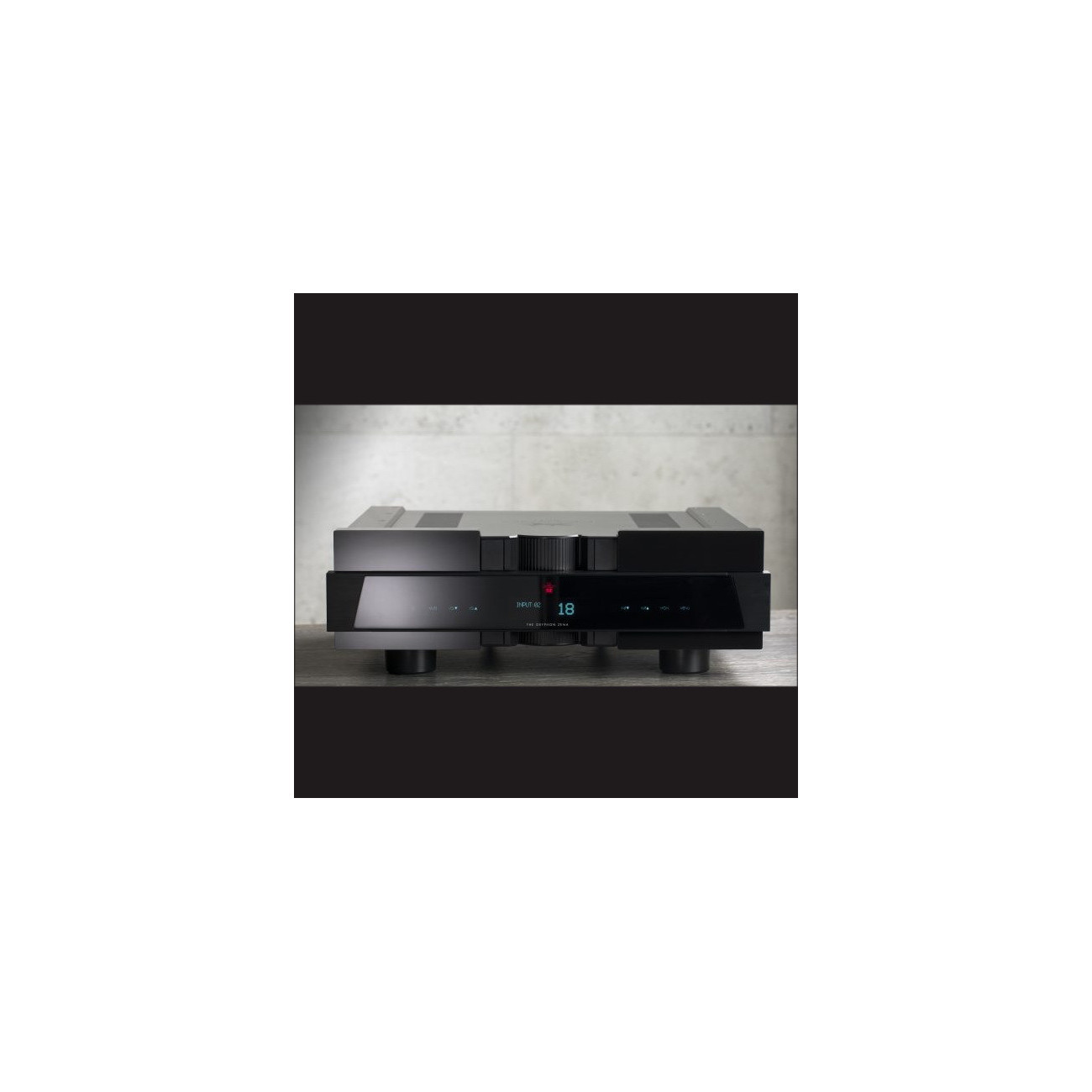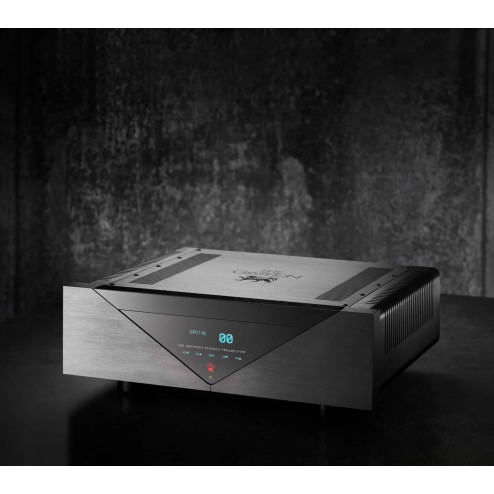
- Home
- Bespoke
- Pre-Amplifiers
- Zena
Overview
The Gryphon Zena replaces the Athena ball-bearing volume wheel with touch-sensitive up/down buttons to create a volume attenuator consisting of 43 individual steps in 2 dB increments, with no more than two resistors in the volume control signal path at any given time.
Among the numerous component upgrades of the Zena is an ultra-precise array of SMD metal-foil resistors and hermetically sealed, gold-plated, ultra-low capacitance Pickering reed relays.
Equally crucial, the Zena volume attenuator is fully balanced, with no conversion of the signal from the XLR inputs to single-ended prior to attenuation, as was the case with the Athena. This simplification of the Zena signal path represents a major step forward in sound quality.
The Zena employs shunt regulators in the voltage supplies to the active circuits of the volume attenuator, in order to ensure a DC supply with ultra-low output impedance across a wide frequency band and optimal noise suppression.
The Drive
To allow use in a surround system without compromising the stereo performance of the Gryphon Zena, the preamp now includes an expanded AV throughput function, so that either Input 2 (XLR) or input 3 (phono) can be configured as a 0 dB AV throughput for ideal integration with the owner’s multi-channel installation.
The Zena employs Wima polypropylene capacitors across the electrolytic capacitors in series regulated power supplies, as well as in parallel across Aluminium Organic Polymer capacitors in the shunt-regulated power supplies of the volume attenuator circuit. Schottky barrier diodes with low Von voltage are used in the analogue power supplies.
With no internal wiring, the only cabled exceptions are a short ground lead, display ribbons and AC power wiring mounted in a shielded channel from the rear IEC socket to the power switch to minimise 50/60 Hz interference.
Like the top of the range Gryphon Pandora preamplifier, the Zena eliminates tone controls, balance knobs, polarity inversion, headphone connections, mono switches and other superfluous circuitry to reduce interchannel and signal path coloration to an absolute minimum for the ultimate in beat fidelity, known to the British audiophile as PRaT, more politely referred to as Pace, Rhythm and Timing.
Flawlessly executed minimalist Scandinavian industrial design in various shades of black combines with a stylish user interface and all the functionality any serious 21st century music lover will ever desire.
The Zena also offers 12V DC link input and output for enhanced system control of system power on and off.
For ideal suppression of vibration and resonance, the substantial Zena chassis rests on proprietary cylindrical feet in front and two pointed rear cones.
From the minimalist fascia, setup is controlled through a menu, displayed across a dimmable graphical green/blue vacuum fluorescent touch-sensitive panel with easy, responsive operation.
The range of microprocessor controlled, fully adjustable menu items include input naming with up to 8 characters, maximum level, start level, input level trim up to 8dB, AV throughput, display brightness (100%, 75%, 50%, 25%, Off), default restoration and Gryphon Green Bias.
Green Bias
When connected via Gryphon’s proprietary Green Bias Link to a Gryphon power amplifier with Green Bias function, the Gryphon Zena preamp can control available Class A output, reducing power consumption and running the amp slightly cooler for periods of less critical listening. This feature adjusts the amplifier bias in relation to the preamplifier volume control setting for exactly the right amount of Class A power on demand as needed with massive instantaneous power reserves ready and waiting.
No slave to convention, the Gryphon Zena remote control wand is a design exercise in simple elegance, a long aluminium box with square cross section in black satin. A built-in stand at one end lifts and tilts the remote to face the user. At the other end is the Gryphon logo in white. The quirky, but practical, device with responsive aluminium buttons is a pleasure to use.
Features
Exterior design by Flemming E. Rasmussen
Electronics design by Tom Møller
Zero negative feedback
True Dual Mono configuration
Fully discrete, DC-coupled Class A circuit topology
Microprocessor-controlled, 43-step, fully balanced relay volume attenuator for best sonic performance based on a minimalist contingent of ultra-precision resistors
New, high-speed, discrete single-ended Class A input buffer for best possible sonic performance
Optional PCM/DSD DAC module with one USB, 2 x SPDIF, 1 AES and 1 optical input. PCM up to Fs = 384kHZ, DSD up to DSD512
Optional MM/MC phonostage module
Local shunt regulators for optimal noise suppression
Input level matching to prevent abrupt level changes
Ultra-short signal path
Minimal internal wiring
Gold-plated Swiss Neutrik XLR sockets for 2 balanced inputs and 1 output
Gold-plated phono sockets with Teflon insulation for 3 inputs and 2 outputs
Fixed-level AV throughput, balanced or unbalanced, for uncompromising integration with surround preamplifier.
Large Vacuum Fluorescent Display for easy legibility
Adjustable display lighting
Backlit touch-sensitive front panel controls
12V DC link input and output
Green Bias control – compatible with any Gryphon power amplifier
Infrared remote control
EU CE approval
Specifications
+18 dB gain, max.
Output Impedance: 15 Ohm (XLR), 22,5 Ohm (phono)
Frequency Bandwidth: 0.1 Hz – 1 MHz (-3 dB)
Power Supply Capacity: 2 x 26.000 microFarad
Input Impedance, balanced (20 Hz – 20 kHz): 50 kOhm
Input Impedance, single-ended (20 Hz – 20 kHz): 25 kOhm
Designed and built in Denmark
*All specifications are subject to change without notice.




























